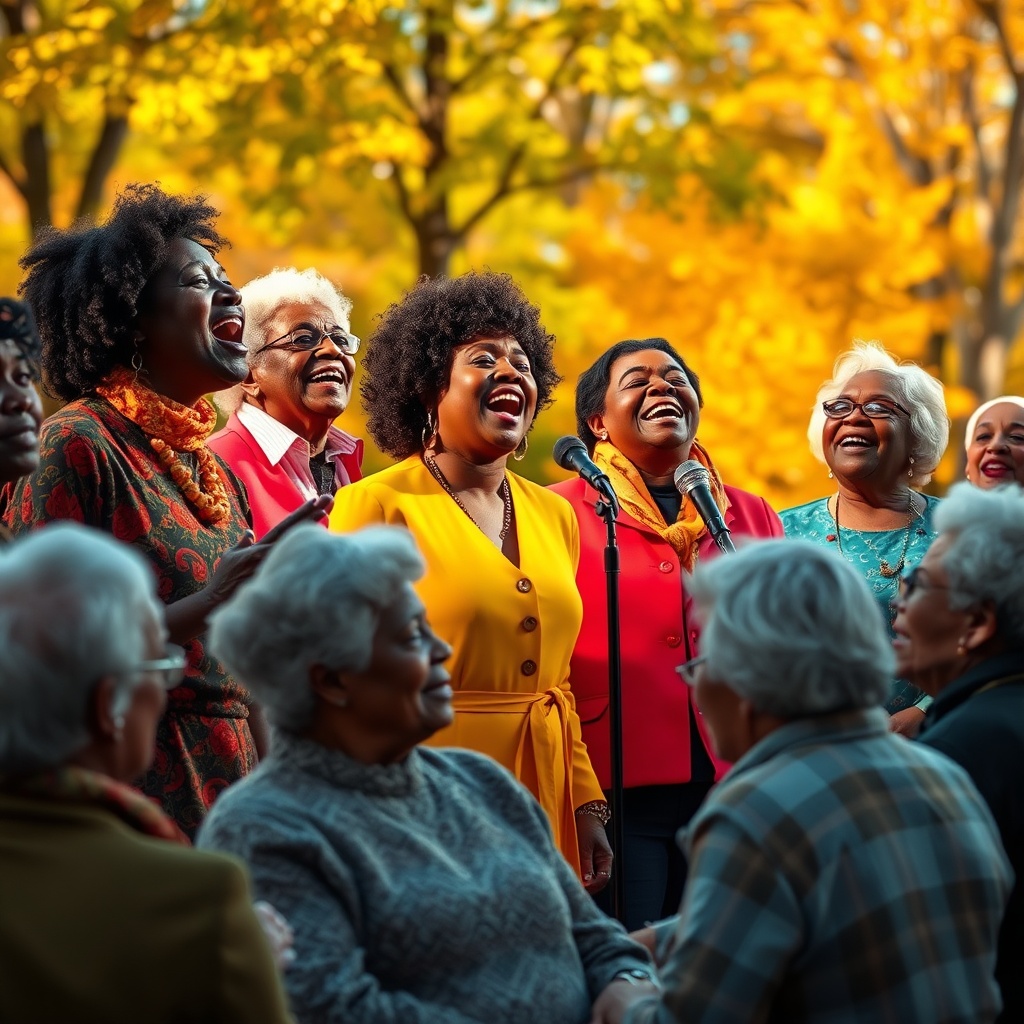Echoes of the Past: Reliving the Melodies of Change

The 1960s were a pivotal decade in the history of the United States, marked by a relentless struggle for civil rights and social justice. Among the most powerful tools in this movement were the voices of Black American singers, whose melodies echoed the pain, hope, and resilience of their communities. Let us embark on a journey through the echoes of the past, reliving the profound impact of these artists who sang for change.
The Soundtrack of a Movement
Music was not just entertainment; it was a powerful form of expression. The songs of the 1960s became anthems that rallied people together, fostering a sense of unity among those fighting for equality. From the soulful ballads of Sam Cooke to the spirited protest songs of Nina Simone, each note carried the weight of history.
Key Artists and Their Contributions
| Artist | Notable Song | Impact |
|---|---|---|
| Sam Cooke | “A Change Is Gonna Come” | Symbol of hope and perseverance during the Civil Rights Movement. |
| Nina Simone | “Mississippi Goddam” | Powerful critique of racial injustice; called for urgent change. |
| Mahalia Jackson | “Take My Hand, Precious Lord” | Spiritual anthem that inspired many during difficult times. |
| James Brown | “Say It Loud – I’m Black and I’m Proud” | Empowerment anthem that celebrated Black identity and pride. |
Reliving the Melodies
Imagine sitting in a cozy living room, perhaps with a few friends or family members. You hear the familiar strains of a classic song from the 1960s. What emotions does it stir in you? Music has the power to transport us back in time, evoking memories and feelings we thought we had forgotten.
As you listen, consider the following:
- What memories does this song bring back?
- How did music influence your own experiences during the 1960s?
- Are there artists from that era whose stories resonate with you?
The Legacy of Resilience
The resilience shown by Black American singers in the 1960s continues to inspire artists today. Their courage to speak out against injustice through their music laid the groundwork for future generations. Reflect on the following:
- How do you see the influence of 1960s music in today’s songs?
- Which contemporary artists do you think carry on this legacy?
As we revisit the melodies of change, let us honor the voices that bravely sang for freedom and equality. Their songs are not just echoes of the past; they are reminders of the ongoing journey towards justice. In remembering them, we keep their spirit alive.
Soulful Struggles: The Power Behind Every Note

The 1960s were a pivotal decade in American history, marked by profound social change and the fight for civil rights. Within this context, Black American singers emerged as powerful voices, using their art to express the struggles and resilience of their communities. Each note they sang carried the weight of history, pain, and hope.
The Historical Backdrop
To understand the significance of these artists, we must first explore the historical backdrop of the 1960s:
| Year | Event |
|---|---|
| 1963 | March on Washington for Jobs and Freedom |
| 1964 | Civil Rights Act Signed |
| 1965 | Voting Rights Act Passed |
| 1968 | Assassination of Dr. Martin Luther King Jr. |
The Artists and Their Impact
Within this turbulent era, several iconic Black American singers rose to fame, each contributing to the narrative of freedom through their soulful music:
Aretha Franklin: Known as the “Queen of Soul,” her powerful voice and songs like “Respect” became anthems for the civil rights movement.
James Brown: With his energetic performances and songs like “Say It Loud – I’m Black and I’m Proud,” he celebrated Black pride and resilience.
Nina Simone: Her haunting melodies and poignant lyrics, particularly in songs like “Mississippi Goddam,” highlighted the struggles faced by African Americans.
Sam Cooke: His song “A Change Is Gonna Come” became a hopeful cry for equality and justice.
Music as Resistance
Music served not only as entertainment but also as a form of resistance. It was a means to:
Raise Awareness: Songs addressed social injustices, drawing attention to issues like segregation and poverty.
Inspire Action: Melodies motivated individuals to join protests and movements, fostering a sense of unity.
Express Emotions: Artists conveyed feelings of sorrow, anger, and hope, allowing listeners to connect deeply with their experiences.
Legacy of Strength
The legacy of these singers transcends their time. Their music continues to inspire new generations, reminding us of the power of art in driving social change. Here are a few reflections on their impact:
Empowerment: The anthems of the 1960s remind us that music can empower and uplift.
Community: These artists fostered a sense of community and belonging.
Hope: Their songs remain a source of hope and motivation for ongoing struggles for justice.
Discussion Questions
To engage with this rich history, consider the following questions:
Which song from the 1960s resonates with you the most and why?
How do you think the struggles faced by these artists reflect the issues we see today?
What role do you believe music plays in social movements?
In conclusion, the soulful struggles of Black American singers in the 1960s were not just about music; they were about the fight for freedom, dignity, and equality. Their voices are a testament to resilience, echoing through time as a powerful reminder of the ongoing journey towards justice.
From Heartbreak to Harmony: The Stories Behind the Songs

Unraveling the Melodies
In the 1960s, the music of Black American singers was not just entertainment; it was a powerful vehicle for social change. Each song told a story, a reflection of the struggles and triumphs of the African American experience. Let’s explore these moving narratives that turned heartbreak into harmony.
The Power of Pain
“A Change Is Gonna Come” by Sam Cooke is one of the most iconic songs from this era. Born from his own experiences of racial discrimination, Cooke’s heartfelt lyrics expressed a deep yearning for equality. Can you recall a time when a song spoke to your own struggles?
Voices of Resilience
“Strange Fruit”, performed by Billie Holiday, transformed the haunting realities of lynching into a poignant anthem. Its haunting melody and powerful lyrics evoke a sense of urgency and sorrow. What emotions did this song stir in you when you first heard it?
From Heartbreak to Harmony
Many singers channeled their pain into songs that fostered hope and unity. The Staple Singers, for example, created music that brought people together. Their song “I’ll Take You There” became a spiritual anthem, inviting listeners to envision a brighter future. How do you think music has the power to heal?
Interactive Reflection: The Soundtrack of Our Lives
Consider the songs that have shaped your life. What stories do they tell? Share your experiences:
| Song Title | Artist | Your Story |
|---|---|---|
| “A Change Is Gonna Come” | Sam Cooke | ______________________ |
| “Strange Fruit” | Billie Holiday | ______________________ |
| “I’ll Take You There” | The Staple Singers | ______________________ |
The Legacy Lives On
The songs of the 1960s continue to inspire generations. As we listen to these timeless pieces, let’s remember the stories behind them. They remind us of the resilience of the human spirit and the unyielding pursuit of freedom.
Chords of Courage: How Music Became a Weapon for Freedom
Introduction to the Power of Music
Music has always been more than just a form of entertainment; it is a profound means of expression and communication. In the 1960s, during a time of intense social and political upheaval, Black American singers harnessed the power of their voices to fight against oppression and to inspire hope. How did they transform their melodies into anthems of freedom? Let’s explore this transformative journey together.
The Historical Context
Understanding the challenges faced by Black Americans during the 1960s is crucial. The Civil Rights Movement was in full swing; activists were fighting for equal rights, and the struggle was often met with violence and resistance. This was a time when music emerged as a rallying cry. It transcended barriers, uniting people in their quest for justice.
Voices that Resonate
Consider the resonant voices of artists like Marvin Gaye, Aretha Franklin, and Billie Holiday. Each used their platform to address social injustices. Can you recall any specific songs that moved you during this era? These artists infused their music with messages of hope and resilience.
Music as a Form of Protest
Many songs became synonymous with the movements of the time. Tracks like ‘A Change Is Gonna Come’ by Sam Cooke and ‘Respect’ by Aretha Franklin became anthems for change. How do you think these songs affected the morale of those fighting for civil rights? Music became a weapon of choice, galvanizing support and spreading awareness.
The Power of Lyrics
Lyrics served as a reflection of the struggles and dreams of the community. They conveyed deep emotions and aspirations for a better future. Take a moment and think about a lyric that has stayed with you. What feelings does it evoke?
Community and Connection
Music fostered a sense of unity. Community gatherings often featured singing and dancing as forms of expression. How did these gatherings strengthen your own community ties? The shared experience of music allowed individuals to come together, creating a powerful bond through shared struggle.
The Legacy of 1960s Music
The influence of 1960s music extends far beyond its time. It inspired future generations of artists and activists. Have you noticed how contemporary artists continue to draw from this rich history? The chords of courage played in the 1960s still resonate today.
Conclusion: A Call to Remember
As we reflect on this era, let us remember the profound impact of music. It was a tool for empowerment, a source of comfort, and a way to articulate the inexpressible. What songs from the 1960s still echo in your heart? Share your memories and let the chords of courage continue to inspire us all.
Unity in Dissonance: The Voices That Brought Us Together
In the 1960s, a powerful wave of musical expression emerged from the heart of the African American community. This was a time when songs became more than mere entertainment; they transformed into a platform for unity and protest. As you reflect on this era, think about the melodies that stirred your soul and the lyrics that inspired change.
The Power of Song
Music has always held a unique power to connect people. During the 1960s, Black American singers used their voices to address social injustices and to unify those who felt marginalized. Artists like Aretha Franklin, Sam Cooke, and Nina Simone became beacons of hope, reminding us that our struggles were shared.
Shared Experiences
Consider the moments when you gathered with friends or family to listen to these iconic singers. Their songs often spoke of struggle, love, and resilience. How did these shared experiences shape your understanding of community and togetherness? Reflecting on this can remind us of the strength found in unity.
Voices of Protest
Many songs from this era were born out of the Civil Rights Movement. For instance, Sam Cooke’s A Change is Gonna Come became an anthem of hope and change. Can you recall hearing this song and feeling its deep emotional pull? It was a reminder that change was not only necessary but inevitable.
The Role of Performances
Live performances became a site for activism. Singers like Marvin Gaye and James Brown used their platforms to bring attention to societal issues. Think back to any concerts you attended or watched on television; how did the energy of the crowd amplify the message of the music?
A Legacy of Unity
The legacy of these powerful voices continues to inspire new generations. How have you seen their influence in today’s music? From hip-hop to pop, the themes of resilience and unity persist. This continuity shows us that the fight for equality is ongoing, and music remains a vital part of that struggle.
As we reflect on the voices of the 1960s, let us celebrate the unity found in dissonance. These singers not only entertained but also educated and inspired. Their melodies remind us of our shared humanity and the power of standing together against adversity.
Resonating Resilience: The Legends Who Shaped a Movement
Introduction to the Movement
The 1960s were a pivotal decade in American history, marked by profound social upheaval and a fierce struggle for civil rights. In the heart of this movement were the voices of Black American singers whose melodies and lyrics served as both a call to action and a source of comfort. These artists not only entertained but also inspired change, using their platforms to address the injustices faced by their communities.
Key Figures and Their Impact
Let’s explore the legends who defined this era:
1. Aretha Franklin
Known as the Queen of Soul, Aretha Franklin infused her music with deep emotion and a sense of urgency. Her song “Respect” became an anthem for the civil rights movement, demanding dignity and equality for all. Can you recall how her powerful voice resonated through the airwaves, igniting hope and determination?
2. Sam Cooke
Sam Cooke was another titan of the era. His song “A Change Is Gonna Come” spoke directly to the struggles of the African American community. With its moving lyrics and soulful melody, it became a beacon of hope. Reflect on how his music might have provided solace during challenging times.
3. Nina Simone
Nina Simone, known for her unique blend of jazz, blues, and classical music, used her artistry to address racial injustice. Songs like “Mississippi Goddam” were not just music; they were powerful political statements. How did her fearless approach to music inspire you or those around you?
4. James Brown
Dubbed the Godfather of Soul, James Brown brought a fierce energy to the movement with hits like
5. Mahalia Jackson
As a gospel singer, Mahalia Jackson infused spiritual fervor into the civil rights movement. Her rendition of “Take My Hand, Precious Lord” became a profound moment during Martin Luther King Jr.’s speeches. How did her faith-filled voice impact the listeners of her time?
The Legacy of Their Voices
The influence of these artists extends beyond music; they shaped a cultural identity and fostered a sense of community. Their resilience in the face of adversity resonates even today. Think back to the moments their songs brought you joy or inspired you to take action.
As we reflect on the contributions of these remarkable singers, let us carry their legacy forward. Their voices remind us of the power of music as a tool for change and healing. How can we continue their mission of freedom and equality in our own lives?
Melodies of Hope: Inspiring Generations with Every Verse
The 1960s was a decade marked by profound social changes and a fervent quest for civil rights. Among the many voices that rose during this era, the melodies of Black American singers resonated deeply, echoing the struggles and aspirations of a generation. Their music became a soundtrack for change, a source of hope, and a bridge between communities.
Historical Context
In the backdrop of the Civil Rights Movement, music served as both a weapon and a balm. Artists like Aretha Franklin, Sam Cooke, and Mahalia Jackson used their voices to challenge injustices and inspire resilience. Imagine gathering around a radio, feeling the waves of soulful melodies wash over you, each note a rallying cry for equality.
Key Artists and Their Impact
Let’s take a moment to reflect on some of the influential singers who used their talents for the greater good:
- Aretha Franklin – Known as the “Queen of Soul,” her rendition of “Respect” became an anthem for both the feminist and civil rights movements.
- Sam Cooke – His song “A Change is Gonna Come” captured the essence of hope during turbulent times, offering a vision of a better tomorrow.
- Mahalia Jackson – As a gospel singer, she infused her performances with a sense of spiritual strength, often singing at civil rights rallies.
Lyrics from this era often conveyed powerful messages. Consider how words can uplift and unite. For instance, when Sam Cooke sang:
“It’s been a long, a long time coming, but I know a change is gonna come.”
These lines encapsulated the longing for change and the belief that it was possible. Think about how these sentiments resonate even today, inspiring new generations to continue the fight for justice.
Interactive Reflection
Now, let’s engage with the music. Close your eyes and recall a song from the 1960s that moved you. What emotions did it evoke? How did it shape your perspective?
Consider sharing your memories with friends or family. Here are some questions to ponder:
- What specific lyrics stood out to you?
- Did the music inspire you to take any action or change in your life?
- How do you think this music continues to influence younger generations today?
The melodies of Black American singers in the 1960s were not just entertainment; they were a lifeline of hope, resilience, and inspiration. As we reflect on their contributions, let us carry their messages forward, ensuring that the fight for freedom and equality continues to resonate in every verse.
The Soundtrack of a Revolution: Songs That Changed History
The 1960s was not just a decade of change; it was a powerful movement led by the voices of Black American singers. Through their music, they provided a soundtrack for a revolution, echoing the struggles and aspirations of many.
Key Songs That Defined the Era
| Song Title | Artist | Year | Impact |
|---|---|---|---|
| “A Change Is Gonna Come” | Sam Cooke | 1964 | This song became an anthem for the Civil Rights Movement, capturing the hope and determination for change. |
| “Strange Fruit” | Billy Holiday | 1939 | A haunting protest against racism and lynching, it was reintroduced in the 1960s as a powerful reminder of America’s dark history. |
| “Respect” | Aretha Franklin | 1967 | Originally written by Otis Redding, Aretha’s version became a declaration of both personal and political empowerment. |
| “The Times They Are a-Changin’” | Bob Dylan | 1964 | While not a Black artist, this song resonated deeply within the movement, calling for societal change and justice. |
| “Say It Loud – I’m Black and I’m Proud” | James Brown | 1968 | This song became a rallying cry for Black pride and empowerment, encouraging a celebration of Black identity. |
Impact of Music on the Movement
Music was more than entertainment; it served as a tool for activism. It united people, inspired marches, and brought attention to social injustices. The lyrics of these songs expressed the pain, hope, and determination of a generation.
Engaging with the Music
Take a moment to reflect on how these songs impacted your own life or the lives of those around you. Did they inspire you to take action or change your perspective? Listen to a few lines of these powerful anthems and feel the energy of the era.
The songs of the 1960s are not just historical artifacts; they are living reminders of the resilience and strength of Black American singers. They shaped the culture and continue to inspire movements today. As we remember their legacy, let us carry forward the message of justice and equality.
Cultural Anthem: The Role of Black American Singers in the 1960s
In the vibrant tapestry of the 1960s, Black American singers emerged as powerful voices of change, weaving their music into the very fabric of the Civil Rights Movement. These artists did not merely entertain; they became the cultural anthems of a generation striving for equality and justice.
Imagine gathering around the radio, the air thick with anticipation as the soulful melodies of artists like Aretha Franklin, Sam Cooke, and Marvin Gaye filled the room. Their songs were not just tunes; they were calls to action, resonating deeply within the hearts of those who yearned for freedom.
Music as a Tool for Change
Music has always possessed a unique ability to unify and inspire. In the 1960s, it became a tool for change. Black American singers used their platforms to highlight the struggles faced by African Americans. Let’s explore how their music contributed to the movement:
- Awareness: Songs like “A Change is Gonna Come” by Sam Cooke articulated the pain and hope of African Americans, bringing awareness to the injustices they faced.
- Unity: Artists organized concerts that served as fundraisers for civil rights organizations, uniting people in the fight for justice.
- Empowerment: The uplifting lyrics of songs such as “Respect” by Aretha Franklin empowered individuals to demand their rights and stand tall in the face of adversity.
A Lasting Legacy
As we reflect on this era, it becomes clear that the contributions of Black American singers in the 1960s extend far beyond music. They left a lasting legacy that continues to inspire today. Their songs remind us of the power of resilience and the importance of standing up for what is right.
Consider the impact of these melodies on our lives. Have you ever felt a sense of connection or hope through music? The voices of these artists transcend time, resonating even with those who may not have lived through the 1960s.
In conclusion, Black American singers of the 1960s played a pivotal role in shaping the cultural landscape of their time. Through their music, they provided a voice for the voiceless and an anthem for the oppressed. As we celebrate their contributions, let us remember the enduring power of music to inspire change and foster unity.
Legacy of Liberation: Honoring the Voices That Still Inspire
Exploring the Impact of 1960s Black American Singers
The 1960s was a pivotal decade in American history, marked by social upheaval and the fight for civil rights. During this time, a powerful wave of Black American singers emerged, using their voices as instruments of change and liberation. These artists not only entertained but also inspired a generation to dream of a more just society.
Key Figures Who Shaped the Movement
Let us take a moment to reflect on some of the influential figures of this era:
Aretha Franklin: Often called the ‘Queen of Soul,’ her rendition of ‘Respect’ became an anthem for both the civil rights and feminist movements.
Sam Cooke: With songs like ‘A Change is Gonna Come,’ Cooke’s music encapsulated the hopes and struggles of the Black community.
Marvin Gaye: His soulful melodies in ‘What’s Going On’ challenged the status quo and urged listeners to confront social issues.
The Power of Music as a Tool for Change
Music has a unique ability to unite people in common cause. During the 1960s, Black American singers harnessed this power to raise awareness and inspire activism. Their lyrics often spoke of pain, hope, and the relentless pursuit of freedom.
Interactive Reflection: What Do These Voices Mean to You?
As we honor these remarkable artists, we encourage you to reflect on the impact their music has had on your life. Consider the following questions:
What memories do you associate with songs from the 1960s?
How do you think their music has influenced today’s artists?
In what ways do you feel their messages resonate with current social movements?
Continuing the Legacy
Even today, the legacy of these singers lives on through contemporary artists who draw inspiration from their courageous predecessors. As you listen to music today, think about how the voices of the past continue to guide and inspire.
Join the Conversation
We invite you to share your thoughts and experiences related to the music of the 1960s. Your voice is part of this ongoing legacy of liberation.
